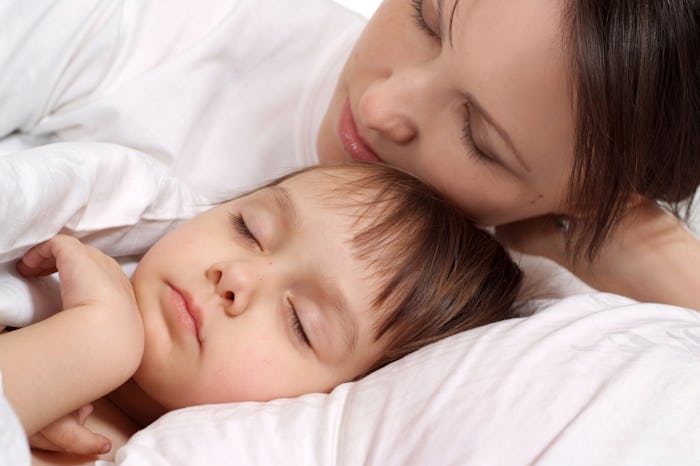Whether you intended to co-sleep or it happened organically (that's a fancy way for saying you just wanted to sleep so you let your kid hog your bed), it's crossed your mind at some point that you need to figure out when to stop co-sleeping. You'll handle the how later, but it's that when that keeps people guessing. When your kid is old enough to express themselves? When you're tired of getting kicked in the ribs? When your child is still small enough that they won't remember?
The answer to when to stop co-sleeping is pretty simple — whenever co-sleeping is no longer working, it's time to stop.
Dr. Craig Canapari, director of the Yale Pediatric Sleep Center, noted on his own website that it's time to stop co-sleeping when it's no longer working. Meaning, if everyone in bed isn't getting a good night's rest, the party's over. It doesn't matter if your little one is sleeping soundly — if you're having a rough time getting adequate sleep, it matters. The reverse is true, too. It can be incredibly hard to give up co-sleeping, but if you notice your child isn't waking up as well-rested as they should or is having difficulty sleeping at night, Canapari says it's time to give up the family bed.
So whether that means you stop co-sleeping when your child is 2 years old or when they are 6 years old, it's totally up to you. If you're worried that letting your child co-sleep for too long will mean that they can never sleep on their own, don't. Dr. James McKenna, director of the Mother-Baby Behavioral Sleep Laboratory at the University of Notre Dame noted that all children eventually learn to sleep alone and it isn't a skill that needs to be taught. It may take a co-sleeping child longer to decide, but eventually, all little ones learn how to sleep. In fact, he argues that it may not even be that co-sleeping children can't fall asleep on their own, but that they just love being with their parents so much, they have no desire to do it.
According to The Bump, experts agree that co-sleeping is a good fit for some families, so don't let some kind of manual or timeline dictate what's best for you and your family. There is no research or evidence that shows kids are affected poorly by co-sleeping either. In fact, studies have found that children who co-sleep are less likely to have behavioral problems than those who don't and are generally more secure and confident.
In short? If co-sleeping works for you and your family, don't worry about when to stop it. According to Canapari, the ultimate goal is good enough sleep. If that means co-sleeping for six years or two, it's up to you and your family — someone will eventually sleep in those Paw Patrol sheets, OK?
